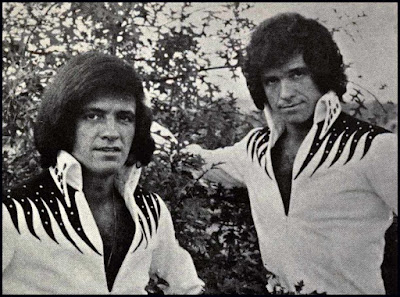Everything seemed to be humming along-except the hits. Sure, some of the cloying song material (e.g. “I Fell in Love with Twins”) leans towards the mawkish, however the musicianship and production provided a top-notch consistency to each release. Around 1965, the Irwin Twins were rebranded as the more hep Len & Glen following in the wake of Simon & Garfunkel. Sonny & Cher, Brady & Grady, et.al. Along with so many others in the music industry, 1965-66 seemed to be their banner years. I could hear “Write Me Baby, Please!” being on the soundtrack of The Incredibles to tie-in with the animated films’ swanky mid-century motifs. In addition, the insertion of a captivating 12-string comes as an unexpected surprise, while enhancing the spy-fi atmosphere. Composed by the brothers themselves, 1965's “Midnight Prowler” is an uptown pop number and comes complete with some injected fuzz-guitar flourishes. Their 15-minutes of fame came on May 26, 1965 when they appeared on the ABC-TV show Shindig! The stellar line-up that night included the Rolling Stones, Sonny & Cher, Jackie DeShannon, Howlin’ Wolf and the previously mentioned Grady & Brady. For their prime-time placement, they performed the pleading “Go Steady With Me” in the same hour that Jagger & Co were declaring the strife of life during a raging war. While they seemed poised on the threshold of greater glory, the rapid cultural and sonic transformations of 1965 made it extremely difficult for these Kentuckians to keep up with the front runners.
Still, the brothers brought some intriguing offerings to the table, as the yearning “Prayer of Love” from 1966 floats atop an almost Eastern undercurrent. In one of those “only in the ‘60s” moments, their "Boo-Hoo-Hoo" was covered in Portuguese by the Brazilian Jovem Guarda duo Os Jovens in 1967. Later songs like 1967’s “Tragedy” feature some pretty ambitious arrangements along with continuing the ‘50s vibes deep into the ‘60s-almost to the point of prefiguring “Love Can Make You Happy” by Mercy. The song reached #6 on their hometown (Louisville) WKLO charts. Closely resembling the soft and lilting melodies of the Cascades and Chad & Jeremy, “More Than Yesterday” finds the folk-pop middle ground between the showroom and the coffee house. The catchy “Kiss & Run'' echoes what Phoenix’s Floyd & Jerry were doing out West in response to the skiffle-beat-pop of Herman's Hermits. Ending on a strong note, “Let Him Know” sounds like their Columbia label-mates the Cyrkle with its bubbly organ crossed with the effervescent bounce of a Gary Lewis & the Playboys hit. The 12-string guitar embellishments reappear on this track that seemingly was never previously released.
At the time, all the elements were present for some of these songs to leap and bound up the national charts, but ‘60s glory was not to be. Belated reassessment and reevaluation has also eluded them as they leave little trace on the internet. Past and present lack of recognition does diminish from the pop sensibilities, sonic quality and the musicianship found within these singles. Could it be they were a crossover act that never really crossed over, as they simply got caught in the classic crux of too country for pop and too pop-orientated for country in the transition time between the bop & pop of the Newton Brothers (featuring Wayne Newton) and the grapevine country of the Gosdin Brothers? Another explanation could be simply be timing and radically shifting musical landscape during the mid-'60s. Even the Everly Brothers had fallen way off the U.S. charts during this time, despite the fact they were recording glorious folk-rock songs like "I'll See Your Light." While these aspirants seemed on the verge of something big, their career trajectory seemingly went from dust to fleeting Shindig! fame to (record) dust. According to the aforementioned Louisville's Own encyclopedia, the brothers ran up against the inevitable reality of the draft in 1968. After serving their country for two years, the Army Vets eventually attempted their second act and returned to performing and recording music. In 1973, they self-released a single "Freedom Mountain" (written by Turley Richards) backed by their own composition "Come Closer." Regardless of the lack of national success, their honest musical efforts, elevated by Nashville’s finest, continue to stand out across the decades and allow these singles to carry the day. Above all, the tint of time has given a greater sense of the depth and dimension heard in their close harmonies that were there from the start.
 |
| 1972-Openers for Evel Knievel's Grand Canyon Jump? |


this is hep!
ReplyDeleteI was in their band for 20 years they were the best bosses ever total entertainers great people, and the best of friends
ReplyDeletePlayed bass for them for 20 years They were the best band leaders, and we all still remain best friends to this day…Rick Smith
ReplyDelete